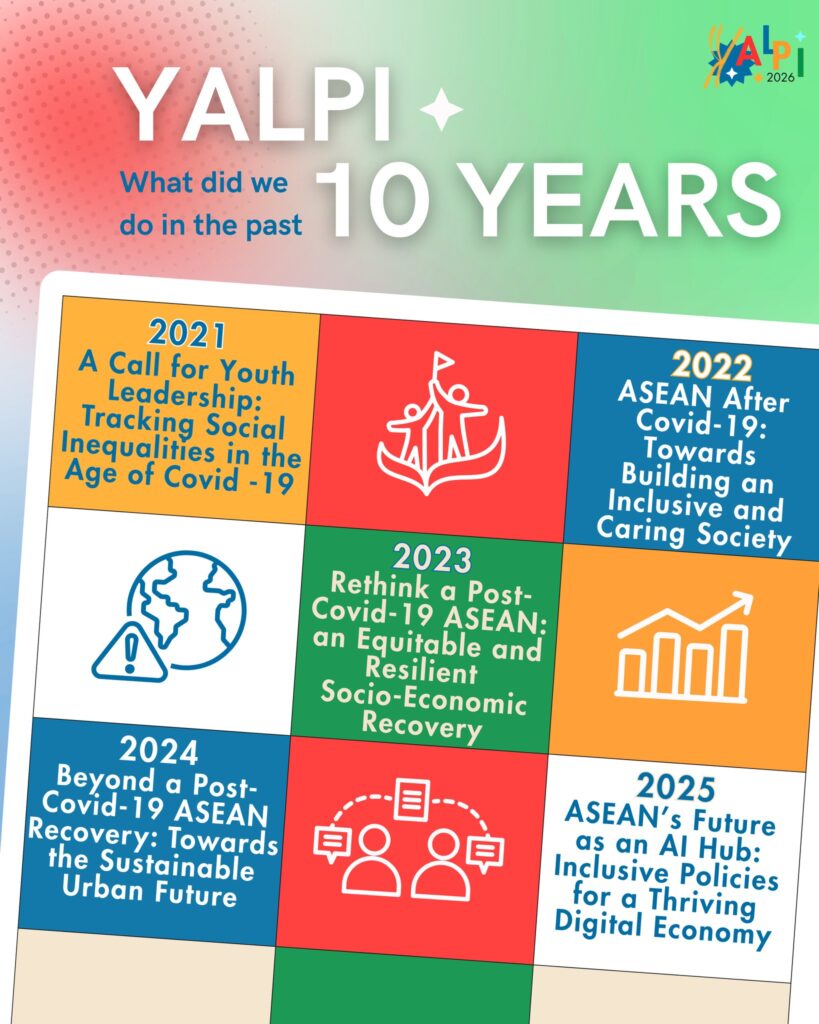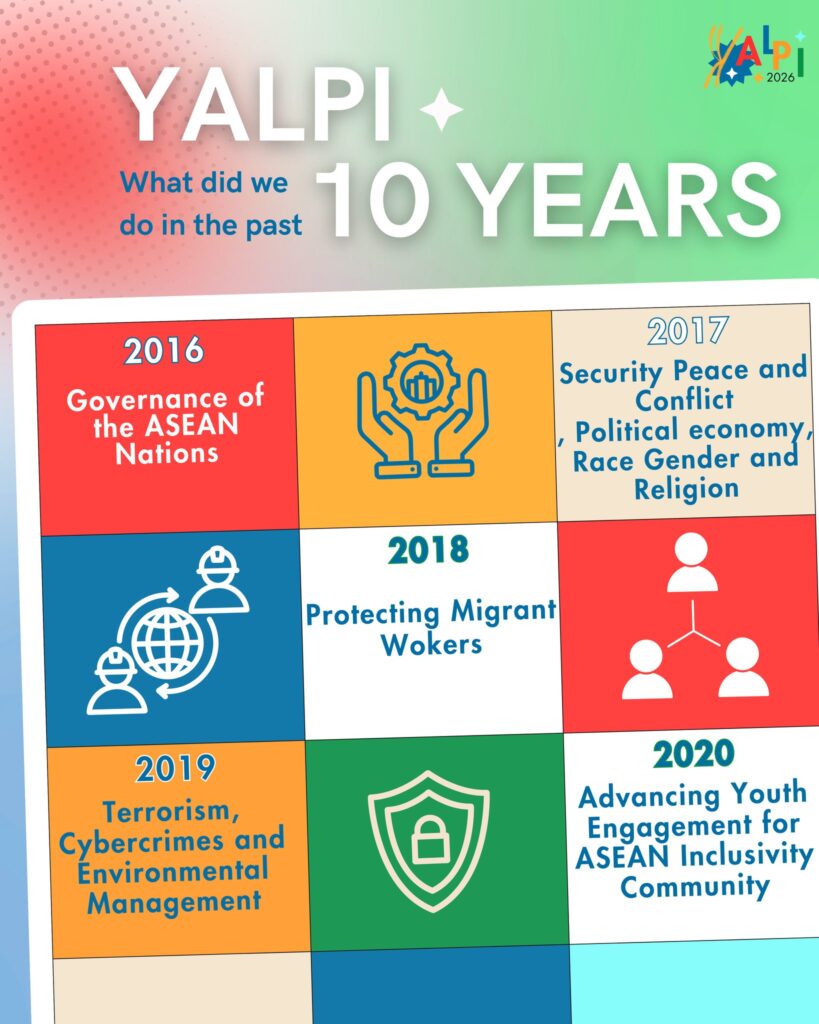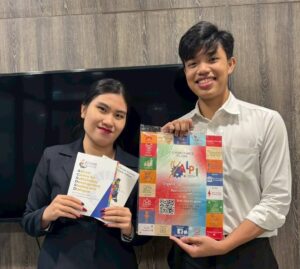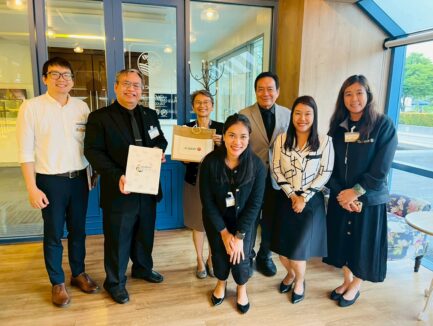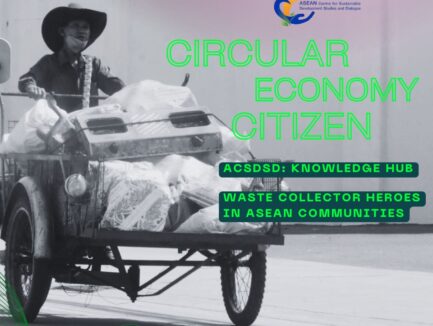ACSDSD spotlight: YALPI 2026 ASEAN Youth Leaders redefine sustainability with ASEAN Centre for Sustainable Development Studies and Dialogue (ACSDSD)
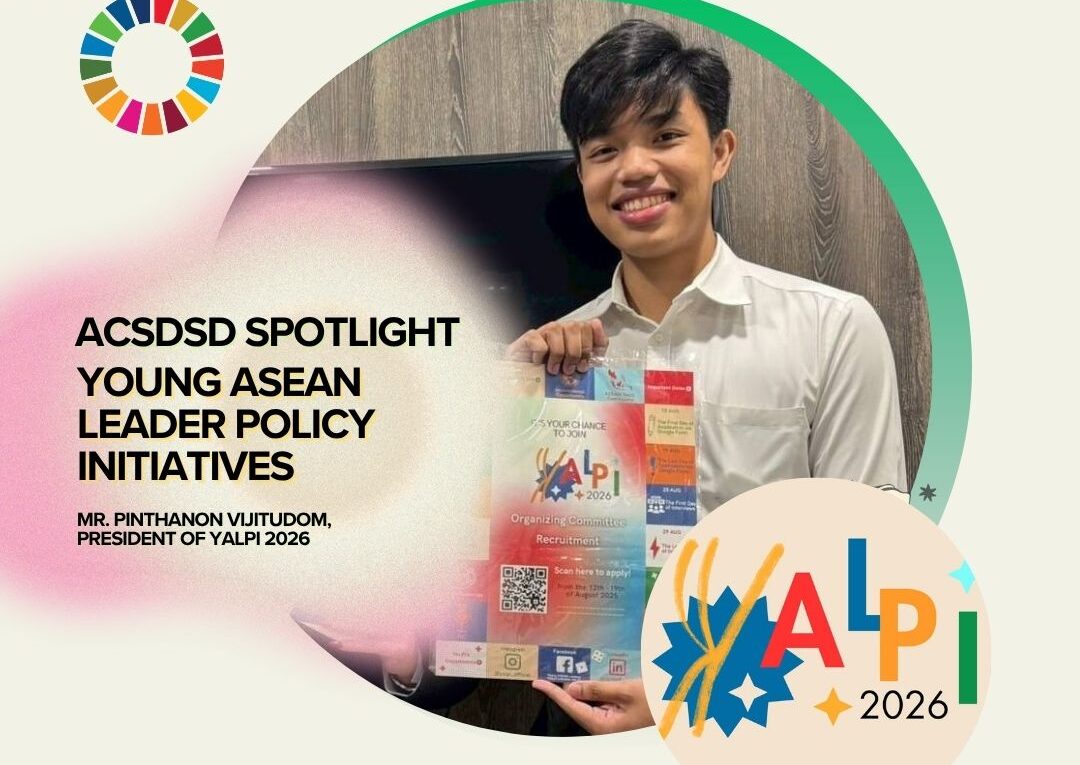
Meet YALPI: ACSDSD’s Spotlight on ASEAN Youth Leaders Driving Sustainability
The ASEAN Centre for Sustainable Development Studies and Dialogue (ACSDSD), a regional hub for excellence in sustainable development, aims to elevate youth engagement and amplify emerging voices across ASEAN. In August 2025, ACSDSD featured the Young ASEAN Policy Initiative (YALPI 2026), spotlighting their efforts to redefine sustainability by linking it to inclusive development, sustainable economic growth, and human well-being, and elevating these youth-driven solutions to international agencies.
In exclusive interviews with ACSDSD, YALPI leaders discuss their view on sustainability and approaches to transform ASEAN into a knowledge-sharing hub, adapting the UN SDGs locally, and addressing systemic challenges in policymaking.
YALPI is a youth-led platform originating policy by youth for youth in ASEAN.
Originating from Chulalongkorn University’s Faculty of Political Science and funded by the university, YALPI is primarily a Thai-led conference that annually brings together youth from all ASEAN member states, including Timor-Leste and East Asian countries, to contribute to regional issues by empowering them to create policy recommendations. The initiative has collaborated with sustainable development institutions that allow youths to drive changes in the society, such as the Thailand Foundation, the Standard, the Thailand Development Research Institute (TDRI) and partnered with policy experts from 101 Public Policy Think Tank, Sciences Po and policy experts from fields related to sustainable development, inclusivity and transition post-covid recovery.
A decade of empowering policy initiatives
YALPI’s objective is to be a platform that empowers ASEAN youth to encourage global issues dialogue and policy-making initiatives.
A YALPI conference inspires innovative, sustainable, and inclusive policy solutions to safeguard youth interests. This year, YALPI aims to expand policy advocacy implementation with international agencies, empowering youth-led policy across ASEAN for sustainable growth.
Contact YALPI
- Facebook: Young ASEAN Leaders Policy Initiative – YALPI
- Instagram: @yalpi_official
- yalpichula@gmail.com
Meet YALPI 2026 Executives
-
“Sustainability is an inclusive concept, yet impractical. ASEAN therefore, should serve as a hub for knowledge-sharing, spreading awareness on sustainability and the principles of the SDGs to youth and people across the region.”
- Mr. Pinthanon Vijitudom President, YALPI 2026
- Ms. Apichaya Rahong. Vice President, YALPI 2026
How do you define sustainability?
Sustainability, from my perspective, goes beyond personal development or the environment. It also covers economic development, the sustainable use of natural resources, and long-term societal growth. For me, sustainability is a highly inclusive concept that ensures global society can develop in the long run. — Mr. Pinthanon Vijitudom, President, YALPI 2026
I feel that advocacy around sustainability often shifts too much toward the individual or gets confined to small projects. These targeted solutions can be useful, but they sometimes neglect structural or systemic issues. As a result, sustainability efforts may solve small problems but fail to sustain quality of life in the long term. That’s why I think we need to advocate for sustainability in a broader sense, one that addresses deeper structural challenges. — Ms. Apichaya Rahong, Vice President, YALPI 2026
What is your opinion on ASEAN’s role in advancing SDGs?
As for ASEAN’s role, I believe ASEAN can adopt the SDGs framework from the United Nations, adapt it to the regional context, and encourage member states to implement it nationally. Beyond that, ASEAN can act as a knowledge hub – disseminating information and raising awareness among both youth and the wider population about the importance of SDG principles. In short, ASEAN can serve as a bridge between the UN and the people in this region, transferring and localizing that knowledge. — Ms. Apichaya Rahong, Vice President, YALPI 2026
Any message for the policymakers?
First, policymakers should strive to understand the unique problems of each country in the region in order to design sustainability policies that are more concrete and actionable. For example, Country A may face one set of challenges, while Country B faces another. Discussing these differences and working together would help create policies that are practical and regionally relevant.
Second, beyond policymakers, I urge ASEAN member states to keep an open mind, accept and listen to external perspectives, and use this feedback to strengthen their own national development. Increased dialogue and knowledge exchange will make ASEAN societies more sustainable and more capable of coexisting. That’s my message. Thank you. — Mr. Pinthanon Vijitudom, President, YALPI 2026
My message to policymakers is this: small-scale policies are useful for solving immediate, localized issues, but it’s equally important to design broader frameworks that are flexible enough to be applied in different contexts. And just as crucial is incentivising policy. — Ms. Apichaya Rahong, Vice President, YALPI 2026
Meet YALPI 2026 Director of Content
Sustainability is not just about the environment. It’s also about people and economies – developing them in ways that can endure over time, supported by risk and mitigation plans to face the unexpected.
- Mr. Supakorn Kajornkiatnukul , Director of Content
How do you define sustainability?
Sustainability is often thought of only in terms of the environment, but for me it’s broader than that. It also means developing people sustainably, developing economies sustainably, and creating systems that can endure in the long term. To me, sustainability requires risk and mitigation plans so that we can respond to the unexpected. That, in my eyes, is the true meaning of sustainability.
What is your opinion on ASEAN’s role in advancing SDGs?
For ASEAN and youth, there are still many gaps. ASEAN does not have commonly binding rules or frameworks that all member states must follow, which makes it difficult to develop comprehensive sustainability policies. ASEAN tends to work through policy incentives – like grouping together for economic cooperation or strengthening trade leverage, but without binding rules. This gap limits the implementation area of sustainability policies.
Any message for the policymakers?
If I could leave a message for policymakers, I would say that because ASEAN mechanisms lack binding rules, the only way to push forward sustainability is to focus on incentives. We need to ask: what international-level incentives will motivate policymakers to prioritize sustainability? Alongside that, we need mitigation plans, a clear vision, and a shared mission that moves forward together. —Mr. Supakorn Kajornkiatnukul, Director of the Content Team for YALPI 2026.
ASEAN Centre for Sustainable Development Studies and Dialogue (ACSDSD) calls for international agencies to collaborate with the YALPI 2026 conference.
Contact: yalpichula@gmail.com
ACSDSD, Formulating Solutions and Pathways for Sustainable Development in ASEAN
ASEAN plays a central role in advancing sustainable development in Southeast Asia by aligning regional priorities with the UN 2030 Agenda for Sustainable Development and the ASEAN Community Vision 2025. The region focuses on five key areas under the Complementarities Initiative:
Strengthening people-to-people connection and sustainable communities is one of the unique functions of the ASEAN Centre for Sustainable Development Studies and Dialogue (ACSDSD).
📘 ASEAN Complementarities Focus Areas
Written by Pakjira Numchaisombut (pakjira.num@acsdsd.org)
